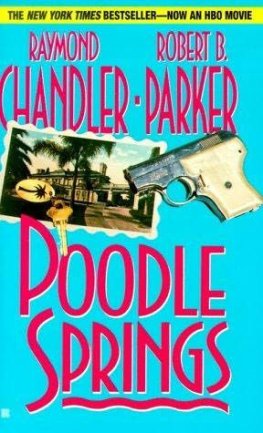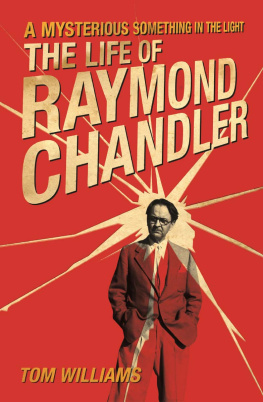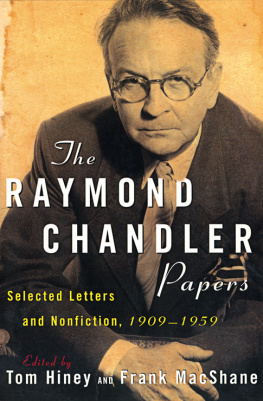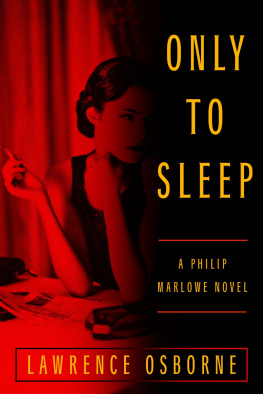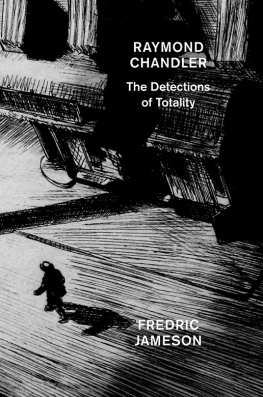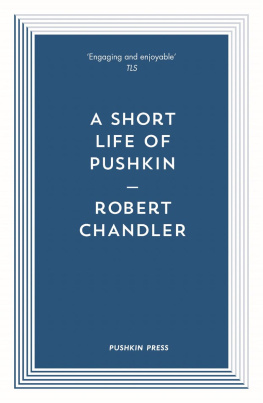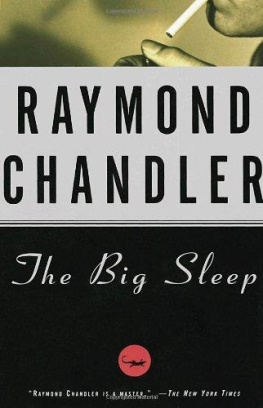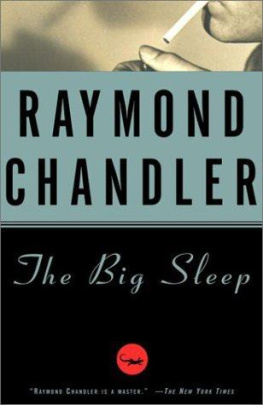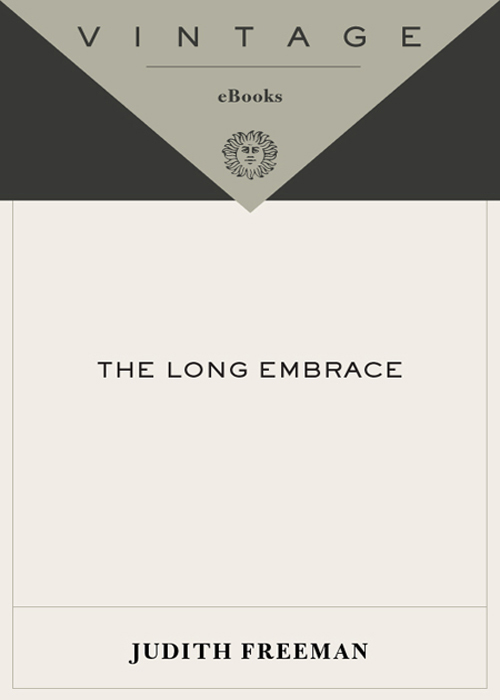
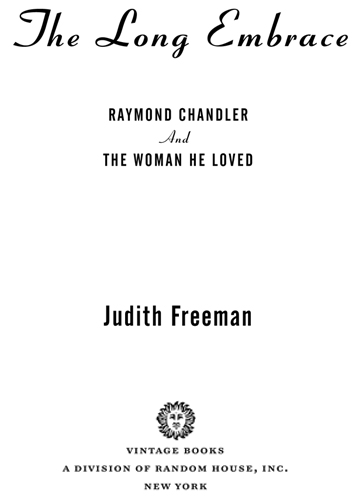
The Long Embrace
CONTENTS
For my own beloved, A.H.
Acclaim for Judith Freemans
The Long Embrace
Atmospheric and unusual.... A restless hallucination of a book about a woman obsessed by a mystery that she knows she will never solveand perhaps does not wish to solve.
The New York Review of Books
Compelling.... Ms. Freeman knows [Los Angeles] as well as Marlowe himself.... Like Cissy, when she crooks her finger, its impossible not to follow.
The New York Times
A novelists nonfiction triumph, building a dramatic life of a private couple from sharp-eyed descriptions of their homes, a respect for the few shards of evidencephotos, letters, papersremaining and a careful reading of Chandlers works.
Pittsburgh Post-Gazette
Crisp, evocative, [and] steeped in Chandlers diffident, romantic style.
The Oregonian
In The Long Embrace, [Freeman] breathes life into the Chandlers dwelling places, giving East Coasters a feeling not only for the couple but for the city of Los Angeles itself.
Howard County Times
Ingenious.... [Chandlers] work is more complex than the ideas they were supposed to be about, and the fears they express are more troubling than the mystery genre can contain. Ms. Freeman, I think, comes the closest to pinpointing his appeal.
Allen Barba, The New York Sun
If you are a fan of Philip Marlowe and the mean streets of The Long Goodbye and other Chandler novels, you will want to tread the occasionally melancholy pathways of The Long Embrace. If nothing else, it will make you want to go out and read Chandler again.
Arkansas Democrat Gazette
Fascinating.... Resonates with pure pleasure.Tucson Citizen
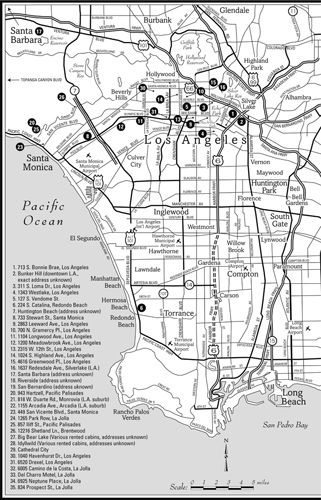
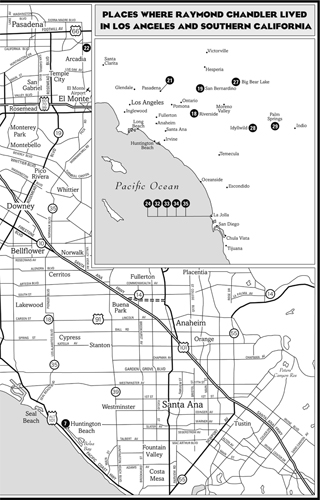
The Long Embrace
One
I n March of 1986 I began reading the collected letters of Raymond Chandler. I was at the time living in an apartment on Carondelet Street in an older part of Los Angeles where Chandler himself had once lived. My neighbors were mostly elderly people who had lived in my building for many years and with whom I had very little contact, except for one old woman who occupied the apartment above me. I had once kicked her little dog when it attempted to bite me as I came up the front steps, and for this she took to tormenting me whenever she could. She would rise early and shuffle past my bedroom window in her heavy leather slippers, speaking baby talk to her small dog or singing loudly, making as much noise as possible in order to interrupt my sleep. She broke flowers off their stems, left bits of paper scattered in my garden. Sometimes when my husband and I returned home, she would be waiting for us and lean out her window and call out in a high, shrill voice, Its the intelligentsiathe intelligentsia has returned! She divided the word intelligentsia into separate syllables, flinging each one down at us as we hurried to open our door. Only in L.A., I thought, could someone make this word sound like a term of such utter derision.
I had read most of Chandlers novels and early stories by the time I picked up the volume of his letters. In truth, I had become obsessed with Raymond Chandler. Chandler once said that great writing, whatever else it does, nags at the minds of subsequent writers who find it sometimes difficult to explain just why they are so haunted by a particular work or author. I could not deny that I had become haunted by Chandler, nor could I really explain exactly why.
As I continued to go through the letters, I also started to read a biography of Chandler, and the facts of his life began to captivate me. I was especially interested in his relationship with his wife, Cissy, who was much older than he: Chandler was thirty-five when he married Cissy Pascal, in 1924. Cissy was fifty-three, although she listed her age on their marriage certificate as forty-three. It wasnt until much later that Chandler learned he had married a woman not eight years older, as he had thought, but eighteen. Some people believe he never learned her true age, and they could be right. In any case, only slowly, over the course of a number of years, did he figure out that his wife was indeed much older than she claimed, though he may never have known exactly how old she was.
Cissy was exceptionally beautiful and witty and sophisticated, irresistible, as Chandler once put it, without even knowing it or caring much about it. At the time she married Chandler, she was said to have the figure and sexual presence of a woman twenty years younger. She was a sensuous woman with a beautiful body, about which she felt no shame. So comfortable was she in her skin that, as Chandler once revealed, she even liked to do her housework naked. But inevitably age took its toll, and by the time Chandler published his first novel, at the age of fifty-one, Cissy was almost seventy and suffering from a lung condition that increasingly confined her to bed. She went from being a wife who offered a lot of sexual enticement to her much younger husband to being a wife who was infirm and required his constant care, whom he nursed assiduously through the abominable anarchy of old age. Still he was completely devoted to her and would later describe his marriage as almost perfect. When Cissy died in 1954, a few months after his sixth novel, The Long Goodbye, was published, Chandler began drinking heavily, attempted suicide, and descended into a grim state of acute alcoholism. He lived less than five years without herfive very difficult and in many ways wretched years. My only problem, he wrote to a friend during this period, is that I have no home, and no one to care for if I did have one. In reading his letters, I came to see that what Cissy had done for Chandler was to enable him to live in what Kafka called the existent moment. Without her he was, literally, dead.
The more I read about Chandler, the more interested in Cissy I became. I felt I knew this woman somehow, or that I could know her and possibly bring her to life if I were to try, even though very little was known about her. She left almost nothing behind at the time of her death, no writings or letters. No biographer of Chandler had ever been able to uncover much information on Cissy. The main problem was that Chandler himself ordered their letters to each other destroyed shortly before his death, even though he had planned to include them in a collection of his letters that was then being discussed and had even written to his English publisher saying, Some of the letters to my wife are pretty hot, but I dont want to edit anything. In the end, he changed his mind. It was as if he decided that if he must die he would take any memory of her with him, forever keeping her to himself.
For much of Cissys lifeor at least the years she spent married to Chandlershe was a rather reclusive woman, an enigma, as Chandler scholars are fond of saying. In her later years few people actually met her or were able to provide any recollections of her. Nevertheless, it seemed to me that there were enough references to her in Chandlers letters and, in a more coded way, in his fiction, to begin to compile a portrait of her if only I could connect all the dots. And in this portrait of Cissy, in this attempt to bring her to life, I felt, lay some essence of Chandler himself, the key to his work and his personality. For I had come to believe that it was the domicilethe sanctuary he shared with Cissy and from which the world at large was excludedthat largely formed his views and helped mold the personality of the character he was famous for creating, the private eye Philip Marlowe, with whom he shared a very particular kind of loneliness as well as a sense of sexual anxiety and a code of honor. Cissy was the muse who would inform the central myth of his fictionthat of the white knight whose task it was to rescue those in peril. Actually, two women would, in distinct and yet sometimes similar ways, play this role in his lifehis wife, Cissy, and his mother, Flossie (or Florence). Both women, Chandler felt, were in need of rescue and shared certain characteristicsthey were almost the same age, for instance, and their names had a faintly similar ring. Yet they were also very different in personality.
Next page

